#Responsible dissemination of knowledge
Text
Random Astrology Observation

The fact that Mars is in the first house suggests that confidence, physique, and self-image are highly valued. These people appear to focus their energy on keeping up a powerful, alluring persona. Being eager to give people more self-assurance points to a helpful and inspiring personality.
Mars's position in the ninth house presents an exciting and daring image. The love of adventure, philosophy, and travel fits very well with this placement's expansive character. Extreme sports fervor is indicative of a will to push limits and experience life to the fullest. A desire to disseminate knowledge and a broader viewpoint are reflected in the goal of education and teaching. Adhering to specific values gives their approach more depth and makes the journey lively and meaningful.
Sagittarius Mars traits indicate a great dislike for anything that restricts their freedom or stifles their independence. They don't like to wait around and value efficiency, thus being on time is crucial to them. They cherish their autonomy, therefore any attempts to limit or control them may encounter opposition. People in this role may also become frustrated by unreasonable responsibilities and rigidity.
The variety of characteristics that people with Leo moons exhibit, from a difficult connection with trust to creativity, forgiveness, and a craving for attention and giving. The knowledge of their inclinations, driving forces, and educational experiences deepens the comprehension of this lunar positioning.
Even though it can occasionally come out as judgmental, Virgo Sun people's honesty is valued for its directness. Their readiness to be open about their true emotions and to offer candid counsel is indicative of their dedication to truth and authenticity.
People with Jupiter conjunct Moon are described as having a strong and alluring emotional presence. They seem to have a significant influence on people around them if they can control emotions and use their auras to create a spell. Through their artistic or intellectual endeavors, individuals appear to have secret knowledge banks that open up when they communicate their feelings. The secret to revealing the depth and richness within is found in the allure of their bursting emotions.
In fact, the 10th house in astrology is frequently linked to one's profession and public life. It stands for a person's reputation, accomplishments, and career goals. The planets and signs that make up the 10th house, along with any aspects that they may form, can provide information about a person's attitude toward their work, public persona, and desired global influence.
The depiction of Pisces Mercury in a relationship creates a lovely image of profound understanding of their partner and nearly psychic communication since they have sensitive energy to sense whether something is off. When words are utilized they will use it to bring out the most understanding and sensitive parts of their partner, they love a connection that appears to be a source of consolation and healing. They want their friendship or relationship to take on a lyrical and inspiring dimension due to their appreciation of arts especially music and they have the possibility of writing or even dedicating songs for their loved ones.
Mars in the seventh house frequently denotes a forceful and proactive approach to interpersonal connections. People that have this placement tend to be direct, aggressive, and passionate in their relationships. They can be looking for a companion who can have lively conversations and is just as vivacious. They might have a strong desire to take the lead in relationships and relish the excitement of working together on projects. Direct communication and a desire to resolve conflicts amicably are two possible components of conflict resolution.
Venus in the Ascendant, sometimes referred to as Venus in the First House, frequently improves a person's attractiveness, charm, and relationship style. People that are placed in this position typically have a friendly and cheerful disposition. They could be naturally magnetic, capturing the attention of others with their charisma or beauty. Their identity is greatly shaped by their relationships, and they may place a high importance on harmony and aesthetics in their self-expression. A great desire to establish and preserve lovely relationships in the social and personal domains may be present.
885 notes
·
View notes
Note
What makes most "uninhabited wilderness narratives" more similar to like. The European settlement of the Americas than the Polynesian exploration of islands. Like I also get that vibe but I can't form a coherent ideological reason and you seem like maybe you could put it to words.
You’re getting it backwards if you think that the criticism of the “terra nullius” narrative consists of “it’s unethical to go to, poke around, or settle a place that was actually previously uninhabited by human beings.”
Rather, "terra nullius" is a set of concepts and frameworks created and disseminated by Europeans over the course of European settler-colonisation. It consists, roughly, of ideas about land (it is inactive, to-be-acted-upon, eternally stagnant if not acted upon; it must be 'worked' and this work is backbreaking, unpleasant, and a moral and religious duty; 'working' the land completely transforms it; the land is valuable and ownable insofar as it is worked and transformed; land can be bought, sold, and traded)—
—ideas about exploration (another way to act upon land, which is to-be-acted-upon, is by 'exploring' it; 'exploring' land, naming it, mapping it, viewing it from above, even painting landscapes of it. are activities that give you authority and ownership over the land; 'exploration' produces knowledge about land, which only Europeans can produce and disseminate)—
—and ideas about Indigenous peoples (they have not 'worked' the land or claimed ownership in a way we recognise; thus they have no control, authority, or ownership of the land; because of this they are the land, part of the flora, fauna, and landscape to be explored, mapped out [as in linguistics and anthropology], controlled, moved, worked [read: enslaved], and killed; and, crucially, in a final move, once they have been moved or killed, they were never here in the first place).
These ideas arose variously in European scientific, literary, religious, legal, and literary discourses; in sermons, in travel narratives, in paintings, in memoirs and folk stories written by settler-colonists and sailors and traders. They arose partly as a development of things that had already been happening in Europe in the transition to capitalism (enclosure and other forms of primitive accumulation that rendered once-public resources, including land, private property), and partly as a response to the fact that this land was not empty of human life.
Plainly, there were people in the Americas, in Oceania. In fact, they had altered the land in various ways. The scientific and anthropologic majority, at least in Europe from the 17th to the 19th centuries, even held that they were descended from the same stock as Europeans were (though there was debate on that score). Nevertheless, there were resources and money and land (among other things) to be gained through colonisation and genocide.
The idea that these lands, then, were terrae nullius, empty lands, arose as justification for said settling and genocide. There were never people here, and if there were, then they didn't really have the right to be here; they didn't claim the land in ways that Europeans or their descendents legally recognised (in other words, Europeans created property laws on purpose in such a way to deny Indigenous peoples property rights); perhaps they didn't work the land because they were inherently lazy, or promiscuous, or gluttonous, or savage, and that's how a legal discourse becomes a 'racial' one.
So the answer to your question is basically: because Europeans are the ones who wrote "uninhabited wilderness narratives." Because (the peoples who would become) Polynesians in 3000 BC did not invent a bunch of related popular, religious, scientific, legal, and literary discourses in order to deny or justify the fact that they were enslaving, driving off, or slaughtering millions of human beings, this just has nothing to do with them.
1K notes
·
View notes
Note
i just wanted to tell you that i really, really respect the way you engage with all of the different things on here. good, new information gets sourced and fact checked and then celebrated, regardless of what it is. you seem to be so comfortable in your knowledge and in your identity that you never get petty about someone else knowing something that is Your Brand that you haven't learned yet (which.. a significant number of popular informational blogs really do), or about being corrected when someone actually does have new, legitimate info that either contradicts what you learned or expands on it. it brings me so much joy to see you celebrating learning new things all the time, especially as you take the role of a teacher on here. sometimes we forget, in the role of a teacher, that we are still growing and learning every day we are alive in the world. that you never stop being a student, even when you become a teacher, because there is more knowledge in the universe than anyone can learn in 30 or 50 or 1000 years. so it's just so good to see you engage with the world, your work and your followers as teacher and student simultaneously.
shitty information given in good faith gets fact checked and gently but firmly rebutted, without discouraging the curiosity of the person who proposed it. you're never mean to someone who asked kindly and in good faith. and the times someone has been earnest but worded poorly, and they've told you as much, you've been very kind and encouraging while not budging on the morality aspect.
and then shitty information given in bad faith gets ridiculed if it's fairly obvious to your general audience, which, you're also somehow literally always very funny about it—and if another person writes in to earnestly ask about it because it wasn't obvious to them, you clarify to them without letting the ridicule of the information and the dickhead that presented it leak out onto curious or uninformed individuals. you don't shame people for not having access to "obvious" knowledge, and you discourage others from it as well.
shitty information given in bad faith that is even slightly convincing gets thoroughly debunked and the people who maliciously disseminated it ridiculed, once again without shaming uninformed / well-meaning people for not knowing things.
and sometimes it makes me very emotional that you are kind, earnest and grounded enough to work out how to respond to these things, for your own mental health/online experience and for all of ours. i just. really appreciate you, bones. you're very good. is what i'm saying.
This is one of the kindest and most thoughtful things a person has ever said to me. Thank you anon, truly. I am struggling to come up with a response that feels appropriate.
1K notes
·
View notes
Note
So with longterm chastity the cock is supposed to temporarily shrink when flaccid right, leading to smaller cages over time. With over 10yrs of being locked and only being unlocked for the Dr and for bike rides it's got to be safe to say that Tom must have shrunk a lot by now.
So what will happen when Tom has gone through all of the small cages, like the nub and nanos etc. Does he then start to wear the flat or inverted cages on a perma basis?
Bc we all know there should be no free room inside of them 😉.
"What you've just said is one of the most insanely idiotic things I have ever heard. At no point in your rambling, incoherent response were you even close to anything that could be considered a rational thought. Everyone in this room is now dumber for having listened to it. I award you no points, and may God have mercy on your soul.”
🔒Tom here. Back in the 90s when the internet was new, one of the things we early adopters were looking forward to was the ability to have widespread knowledge, leading to the increase in education. We believed that having all this information at ones fingertips would make everyone smarter.
Instead, we discovered that the most commonly disseminated materials are not information, but rather, disinformation, misinformation, wrong information, and simply bad information. So, don't take this personally, but pretty much every assumption that you made in your question was just plain wrong.
Being locked doesn't "shrink" your penis. It's not a muscle, and there's nothing there to atrophy. What happens is that the erectile tissue loses it's elasticity, and does not expand to it's previous size after some period of time. This also happens with age, especially with other health factors in play.
I don't measure myself because I'm not a teenager anymore. Has my erection gotten smaller? Yes, probably 10% or so. I don't get many opportunities to observe it, but that's kind of the point with us.
In my opinion, the nub and flat cages are not good for long term wear. Regular cages restrict erections; the tiny cages restrict and compress flaccid tissue. This means they need more frequent removal for cleaning, and there's always the potential for chafing and irritation.
There's no rule that says one's cage should not have any room. A rule of thumb suggests that a cage that is about the size of one's flaccid penis will prevent erections and be more comfortable, but that's about it.
However, I'm still wearing the same cage that I've had for the past six or so years (the A272), and do not have a need to go smaller. And as far as I can tell, all of my hydraulic and plumbing systems are functioning just as they should.

70 notes
·
View notes
Note
I cackle sometimes thinking of Alhaitham x Akasha hacker!s/o. S/o, the disillusioned Kshahrewar scholar who rebels by using their tech/programming knowledge to disseminate classified documents and satire:
"6 DARSHANS CREATED GOD FROM AN EMO CYBORG DOLL!!!"
"100% RAEL: CHEST GEM proof of reincarnated KING DESHRET"
And Alhaitham, the Scribe who has to deal with all this chaos, not realizing the very person responsible is that cutie who talks physics w/him at Puspa Cafe
(not a request – just a headcanon i thought would b funny xD)
skjdkshuh, nonnie! I love your brain for this. This would be so funny, pls!
"emo cyborg doll", I'm deceased 💀
Imagine someone barging into Alhaitham's office, telling him of the chaos and he goes through the akasha profiles of people to see what is going on.
Maybe Alhaitham checks Kaveh's profile first only to see "the peskiest roommate™" as an entry and he is almost inclined to not fix that specific "mistake".
In the entire scientific database, the sources have been replaced by "Source: Trust me, bro!"
Maybe he tries to fight against the influx of fake knowledge all day, annoyed that whenever he has cleaned out one registry another one has been manipulated by the hacker again.
Frustrated he stops for the day, especially since he has agreed to meet up with you, and maybe you'd be able to distract him a bit from today's chaos. But little does he know you were the cause of it.
He tells you of it and you feign innocence, maybe even feel bad that he is the one who has to deal with it alone but deep down you can't help but mischievously smile. Especially since you replaced one line on his akasha profile. What used to be "Scribe" now says "sexiest man alive" and you wonder how long it takes him to find that.
#🍁 dust mail#🍁 garden visitor: anon#genshin impact#alhaitham#alhaitham x reader#sjkdjhskjd kicking my feet#this idea is so chaotic#I'm in love with it hehe#just imagine him ranting about it to you when you're the source of the chaos#perfection#chef's kiss#🍁 dust brainrot
253 notes
·
View notes
Note
Does the idea of househusband gojo inetrest you?
👀👀👀 yes it does omg — imagine gojo as a househusband - he’d be such a simp for his partner like — oh the envy of every person who sees him picking up their kids…
I love it
#sab [asks] #sab [anons] #pls send me asks about this I’m obsessed
in an alternate universe, sukuna and kenjaku are defeated and satoru is alive.
satoru has lived his whole life being a sorcerer. he lived in a vacuum of a society – almost as though he was living in a parallel universe.
and so, in this universe, the ultimate result of the merger is the following: cursed energy gets absorbed and, as such, sorcerers are eradicated.
and so, you end up using this as a way of telling satoru that he needs a break, and, as a result, he ends up becoming a househusband.
why? because why not?
you may have a job you like.
say, as a result of jujutsu, you accumulated knowledge regarding curses/mythology/psychology in various forms of media ranging mosaics to cinema, and you decided to become a professor and teach on that topic? well, now you can, and you don't have to worry about jujutsu any longer! it's a thing of the past.
or, say, your true passion was business and finance? well, now you can! now, you get to live out your dreams of being a hot boss woman in a world full of finance bros.
or maybe your dream was to become an artist, and you never had the time to properly dedicate time for it, but, guess what, now you can! and perhaps you end up making works that reference the curses that you've seen or the experiences that you felt, and you may wish to translate them via oil paint or video art or even performance art, and somehow, perhaps because it's so familiar yet unfamiliar, your work gets popular and disseminated, and even awarded? who knows?
regardless, now, the world is your oyster! nothing is holding you back.
and you want satoru to take a break.
you gently encourage him, perhaps, by first suggesting that it's a temporary arrangement.
but regardless, even in this world of jujutsu that is of the past, satoru has accumulated so many years of work due to being a special grade sorcerer that he has accumulated years of exhaustion. and what ends up being a temporary arrangement of him getting rest for his efforts turns into a semi-permanent arrangement. perhaps.
and while you worked a lot, too, you didn't work in the same way that satoru did when he was a sorcerer. although, to some, it may look like satoru mucked about, he didn't. while juggling responsibilities as a teacher, he also had to tackle and cover a huge number of missions in the whole of Japan as well as abroad. that is one mission after another after another with little to no breaks. perhaps none at all. that is not to dismiss your efforts, of course, but to contextualise them.
meanwhile, you encourage him to try out the things that he might like – be it baseball or singing or something else entirely. or maybe get back into teaching? later?
and so, this marks a foray into the world of satoru the househusband – sorcerer extraordinaire of the past, and househusband extraordinaire of the present.
what comes later? who knows! cats? dogs? children? parrots? a house with a view by the sea? a trip to see giotto & his bottega's frescoes at assisi? or a trip to the andes mountains? a couples' retreat in phuket?
regardless, you take it easy and go with the flow.
and you encourage satoru to take it easy.
did you read my mind?? I literally was thinking this — set exactly after the end of jjk omg. I love this — and he would struggle so much, after being held to such expectations and being forced to work all the time — he wouldn’t know what to do with himself. He probably would even get depressed and anxious — and then eventually he would get used to it.
And oh my god if you had kids, he would be so excited to stay home and play and take care of them— he wouldn’t even want you to work since he’s rich, but if you wanted to, he wouldn’t be opposed
#sab [asks]#sab [anons]#sab [future fics]#apparently a househusband series#I really wanna get back to my sugar daddy! nanami fic on another note#I haven’t forgotten about that
18 notes
·
View notes
Note
Will you let us know how it goes tomorrow???
Hello friend!
Interview done – much tougher than I anticipated, but I did well.
They really dug into the substance of my application, and asked me about queer history, social network analysis (from my PhD work), knowledge dissemination in the 18th century, and other things about method and content... So much for "tell me about yourself"! I snuck in a brag about my many languages and the citizen history projects I've done, both of which got very positive responses.
I'll hear back in about two weeks. I'm happy with how I did, so it's ultimately a matter of seeing if I did better than at least half the other applicants.
#always hard to assess one's own performance#but i didn't have any noticeable stumbles#and got a few “that's a great answer” comments#all in all it was a good conversation with a nice back and forth flow#and i think i dropped enough very specific details to prove i'm not just messing around (samuel johnson's dictionary my beloved)
13 notes
·
View notes
Text
i’m surprised by the amount of attention on that pokemon captcha thing. it did take me some hours but it was honestly relatively low effort for me on the actual javascript side, like i think the database with artist credits and the jp names for the pokemon took a lot longer LMAO (not to say it was effortless, it wasn’t, but idk) i guess it’s bc unlike ayano’s BMF stuff, it’s easy to understand what it’s doing at a glance with no prior knowledge or context
anyway it makes me wanna talk about JS a little more but the issue is my JS knowledge is so… patchy?? most of the stuff i’ve learned so far is the opposite of formal or “proper”, like i sit down and i’m like. i want to make this thing in JS. and along the way i pick up new information and skills by looking up how to do parts i’m unsure how to do. i have completely fuckign winged my way here with a whole lot of google and stack overflow. so i’m not sure if it’s responsible for me to be disseminating knowledge on how to write javascript even though i’m pretty comfortable with scripting for an average neocities user LMAO
idk the true answer is that programming is half professional googling and half professional problem solving. my dad works in the tech world and he agrees with me. it’s the ability to use problem solving skills to envision the means to solve a problem and then being resourceful and knowing how to get to the end result AKA knowing how to browse google and stack overflow until ur eyes fall out of ur skull. so maybe my informal javascript knowledge is fine actually. maybe this is javascript how god intended well actually JS is such a terrible coding language idk if god’s involved in it gonna be real
#kiki was here#kiki.txt#programming#i just woke up a tiny bit ago from that nap it was good#also to be clear im not a professional#my skills are nowhere close to advanced or anything#intermediate Maybe i suppose?#idk im just having a fun time w my little static websites
12 notes
·
View notes
Text
Just two months after the Massachusetts Teachers Association voted in favor of a ceasefire resolution labeling Israel’s defensive war against Hamas as “a genocidal war on the Palestinian people,” the union has once again engaged in the demonization and delegitimization of Israel. On March 21st the MTA hosted a two-hour webinar titled “Context and Connection: Palestinian Struggle Against Anti-Palestinian Racism.”
The webinar claimed to provide a “framework” for understanding anti-Palestinian racism. In fact, the one-sided panel of radical speakers offered a recitation of crude anti-Israel propaganda. “Racism” in their definition is any attempt by the Jewish people to fulfill their right to self-determination and the state of Israel to defend itself from attack by Arab countries and terrorist organizations. Not surprisingly, the Hamas massacre of 1200 Israelis on October 7th was barely mentioned.
The webinar focused instead on claiming Israel, and even in one presenter’s words: the “so-called United States,” are settler colonial states and that anti-Zionism is not antisemitism. Intentionally disregarding major events in the Arab-Israeli conflict and manufacturing absurd historical claims, the webinar promoted a narrative of Palestinian victimhood at the hands of Israeli oppression. Presenters falsely claimed the people living in the mandate during the 1920s were “Jewish Arabs, Muslim Arabs, and Christian Arabs.”
The ancient, indigenous and continuous Jewish presence in the land of Israel, where only the Jewish people have ever established an enduring sovereignty and where vast archeological and historical evidence attests to the Jewish connection is never mentioned.
The speakers misleadingly stated that the many wars launched by Israel’s Arab neighbors “erupted” as if they came out of nowhere. They even redefined the Jewish people as only consisting of a religion ignoring Jewish ethnic and national identities. When an audience member asked whether Israel had a right to exist, the queried presenter was silent, seemingly unable to say yes, and a second injected that Oslo conferred the right and diverted their response to insisting that Zionism is “exclusionary”, ignoring the equal rights enjoyed by all its citizens, Jewish and Arab. A presenter then stated it is necessary to “separate the Israelis from Israel.”
Trafficking in antisemitic tropes, one presenter showed a slide of Jewish organizations’ logos and stated that the criticism of anti-Zionism as antisemitism is made by “Boatloads of pseudo-grassroots organizations” and “billionaires with lots of money to influence presidential elections.”
MTA Union President Max Page stated that the MTA would also be providing a webinar on “the rising tide of antisemitism” in the future. This is risible. The MTA in promoting antisemitic propaganda is in no position to explain antisemitism to anyone.Worse, the MTA has encouraged teachers to spread falsehoods and lies demonizing Israel and Jews in their classrooms. The MTA has proven itself to be an extremist, divisive organization fostering anti-Jewish prejudice in schools rather than providing historical and factual accuracy for understanding an ongoing conflict – and reducing bigotry.
The MTA needs to issue a full and factual retraction of the material falsehoods and defamation of the Jewish people disseminated to the public in its March 21st webinar;
The MTA needs promptly to provide a date and equal time and prominence for a public webinar comprised of knowledgeable speakers on the subject of Israel and the Arab-Israeli conflict to help repair the harm done to public understanding by the MTA;
Teachers, parents, students and all citizens of Massachusetts have reason to be profoundly alarmed by the influence the MTA can have on the Commonwealth’s public schools as well as the wider community. There needs to be swift action to signal rejection of the bigoted messages conveyed by the MTA and to ensure measures that prevent any such messages entering classrooms.
9 notes
·
View notes
Text
Significantly for a book that excavates a history that has been received with shock and scandal to many of its readers, one of the most powerful senses that Ebony and Ivy conveys is the banality of slavery to the university and the social worlds that it was so crucial in maintaining. Colleges extended the normalizing reach of slavery, acclimating (and placing on equal footing) those students who arrived with no first-hand experience of slavery with those students whose lives were directly enmeshed with it, holding slaves in their person or family. Colleges also reproduced slavery to the extent that they served as pivotal sites in the production, legitimation, and dissemination of dominant ideas for emerging generations of the colonial elite. Study thereby became a vehicle for the enshrinement of emerging knowledges in the form of time-honored wisdom. he book’s final three chapters detail the practical operations by which the university’s accumulation and formalization of racial knowledge took shape in “the rise of scientific racism” (190). Academic institutions became the site of the alchemical transformation of highly biased and interested observers of African and Indigenous populations into legitimate knowledge: “Atlantic colleges took these myriad pieces of social information and forged ‘truths’ about human difference”.
Ebony and Ivy, in order to capture its subject, has to defamiliarize its reader with what the nature of a university is. In the colonial Americas, Wilder writes, “colleges were imperial instruments akin to armories and forts, a part of the colonial garrison with the specific responsibilities to train ministers and missionaries, convert indigenous peoples and soften cultural resistance, and extend European rule over foreign nations”. The communities and public trusts colleges served were social formations avowedly in step with the domination of Native nations; they too were specific articulations of the “public” that saw to it that slavery and racial formation operate not only to the well-being of individual owners, but to their collective benefit. Wilder’s study of the university employs a strategy that reads the university as an institution in the making. Colonial-era land grants and leases for colleges enabled their officials “to tap into the wealth being generated in the unfree agricultural economies”. Higher education in this context functioned as a key technology not only of the elaboration and extension of colonial rule in the Americas, but moreover in the construction of intercolonial relations between different settler outposts in the continental Americas and the Caribbean, as well as between the northern and southern English colonies. Entire institutions in the colonial North came to flourish by recruiting students from the plantation-owning elite in the South and the West Indies.
The division of university labor that took shape between the functions of the production of education and the reproduction of the immediate institutional conditions that made education possible corresponded to differential degrees of access to and expulsion from the category of the human. Wilder gets at the problem that the university itself must be socially reproduced even as it is positioned as a key instrument of social reproduction for capital and the nation-state. In so doing, his work allows us to glimpse a version of the university freed from the methodological injunction to view the institution in terms of continuous enlightenment and knowledge production in an abstract or distanced way. he focus on slavery does more than simply scandalize the historicity of the institution. Rather, it opens onto the question of what study itself leaves unthought— what are the social organizations of work and stratifications of humanity necessary to make the work of study possible? Of the many lessons that Ebony and Ivy teaches, one in particular is worth stressing within [Critical University Studies] at present: that there is no history of the university that is not also a history of capital accumulation and capital expropriation. The vaunted university systems of the United States did not simply import their structural models from Oxford and the great German state universities. Their mode of sustaining themselves was derived from and inventive of practices and structures of violence and captivity indissociable from the fact of their genesis as slaveholding settler institutions. Education is not reducible to simple instruction. It is a context constituted as much by students and instructors as it is by those who cleared furnace ashes and emptied chamber pots, by those whose communities were removed for campuses to take root, and by those whose bodies were used as the raw materials for scientific experimentation and discursive elaboration alike.
— Abigail Boggs and Nick Mitchell, "Critical University Studies and the Crisis Consensus", Feminist Studies 44, no. 2., 2018.
12 notes
·
View notes
Text
Social Media Engagement: Forging Deeper B2B Connections
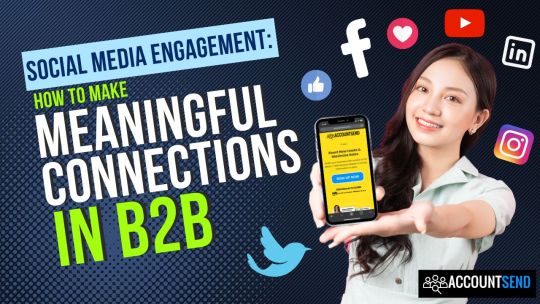
Within the realm of B2B endeavors, the influence of social media transcends its conventional role, stretching its arms wider to embrace a nuanced purpose: building B2B connections, nurturing leads, and catalyzing conversions. In this exploration, we unfurl a compendium of five strategic pillars that unveil the art of cultivating profound B2B connections within the vibrant tapestry of social media.
DOWNLOAD THE INFOGRAPHIC HERE
Understanding Your Audience: The Cornerstone of Engagement
Effective social media engagement germinates from a meticulous understanding of your audience. Go beyond the surface, unearthing the core of their preferences, aspirations, and pain points. Stitch together a mosaic that reveals their favored platforms, the content they devour, and the conversations that strike chords. Armed with this comprehensive panorama, you're primed to craft a bespoke social media strategy that doesn't just beckon, but resonates deeply with their needs.
Creating Value-Driven Content: Navigating the Digital Deluge
In the cacophony of digital discourse, it's the beacon of value that shines the brightest. Propel your brand to a pedestal where it is not just a repository of products but a beacon of industry insight. Step into the shoes of a thought leader, as you orchestrate a symphony of enlightening articles, thought-provoking analyses, and actionable guides. Value isn't just about disseminating information; it's about enriching your audience, empowering them with knowledge, and positioning your brand as an indispensable ally.
Fostering Two-Way Communication: The Bridge to Authenticity
Social media is the realm of dialogue, not monologue. Craft an environment where your brand converses, not merely broadcasts. Cultivate the art of engaging interactions—encourage comments, seed discussions, and be a responsive conversationalist. Through this exchange, your brand metamorphoses from an entity into a presence; it gains a human touch that fosters trust. Authentic communication goes beyond likes; it embodies connections.
youtube
Leveraging Social Listening: Insights as Navigational Stars
In the age of advanced social listening tools, the heartbeats of online conversations around your brand, competitors, and industry trends are within reach. These insights unearth your audience's aspirations, pain points, and trends. Armed with this wealth, you mold your content to mirror their desires, showcasing your brand as a perceptive solution provider.
Consistency is Key: Sustaining Engagement Over Time
In the dynamic whirlwind of social media, consistency serves as the compass that guides your audience back to you. Regularity in posting keeps your brand in the forefront of their minds, fostering interactions and expanding your footprint. When complemented with consistent brand messaging, this rhythm solidifies brand identity and fosters trust.
In the era where B2B social media engagement ceases to be optional and becomes indispensable, these pillars emerge as your guide. By mastering audience understanding, delivering value, nurturing dialogues, utilizing social insights, and embracing unwavering consistency, your brand embarks on a journey that forges connections, fuels growth, and transforms relationships into partnerships.
#B2BLeadGeneration#B2B#LeadGeneration#B2BSales#SalesLeads#B2BDatabases#BusinessDevelopment#SalesFunnel#AccountSend#SalesProspecting#BusinessOwner#Youtube
20 notes
·
View notes
Text
Done with vacation, prepping for a big workday tomorrow and finally got a chance to look at the container worksheet for ""the izcourse"" and it's been really nice to see people's responses to it and to the post.
Thank you to everyone who’s given their two cents, reblogged, and who’s expressed support to the idea of a restorative approach to harm (especially racist harm) in the fandom.
In the spirit of seeing this bear fruit, I've decided to make the spreadsheet "view only" since the last time it got a response was three days ago. I think it's reached a point where there's enough to glean useful information (DM me if u wanna add more).
@ourflagmeansgayrights thank you for doing the work of disseminating the post within your circles. and for keeping this dialogue open. I hope your tumblr break goes well 👋🏽 Tho I was hoping for other voices to join in on the conversation, I didn't expect for them to come in thru our dialogue like that.
When you shared that list, I saw an opportunity to contribute skills and knowledge I have in service of a fandom community that I really care about. A lot of people have expressed in tags that they want to see this go somewhere. Even if its just out of curiosity, even if it’s A Lot, even if it’s really intense, and even if they’re not invested in “the izcourse” itself.
Community care, especially liberation-centered community care, takes vulnerability and creativity and courage and discomfort. I’m sure a lot of us didn’t sign up to do “community care” as part of our fandom experience. We also didn’t sign up for verbal abuse, targeted harassment, and strangers on the internet threatening our livelihoods.
As I mentioned before, I’m a trained facilitator and educate community members on anti racism irl. Creating spaces for people to come together and learn from each other is just what I do 🤷🏽♀️ and this IS A Lot. It’s also well worth the trouble. I think @blow-me-a-kis put it beautifully in these tags.
#the izcourse #ofmd #I fucks heavy with the work Snann is doing to improve the conditons of fandom #we don't all have to be best friends #but we can make this fandom better and we should try #because ofmd means a lot to all of us and we deserve to have accord in the few places in the world where we get a say #talk it through as a crew #also Hell Yeah to my fellow BIPOC canyonites!!! #the responses to the worksheet are brilliant and such a satisfying read #| want yall to understand this is LOVE #Bell Hooks said # Love is a combination of care commitment knowledge responsibility respect and trust #thats what we are building here
(I know that the bit about the Izzy Canyonite responses won’t resonate with everyone. I left it on the tags because believing one can be objective about anything is a trap. 🌻 I can own that “Izzy Canyon” is the subset of the fandom that I’m in and still be invested in the well-being of fans of color and other vulnerable fans throughout the fandom. Also leaving Kis’ words of affirmation because it feels good when ppl recognize that work’s been going into this. Loving and freely given but work nonetheless)
Love is caring about the well-being of the people in the ofmd fandom matters in both concrete (I want my friends to be ok) and abstract ways (other fans deserve to have a fandom experience that’s life affirming). It’s standing up for fellow fans, especially People of Color and other vulnerable fans, when we see them being abused in our digital sandbox. It’s accepting that our hearts beat faster (and not in a pleasant way) when we talk and think about these things because they matter to us.
So this is a direct request to everyone, particularly “Izzy critical” fans, who’re interested in an effort to address harm in our ofmd fandom community restoratively.
Little explanation for each point
Illustrates the “social landscape” we’re working on, particularly the extent of our common ground. Especially useful for an online community
What are the wounds we’re dealing with? Where does repair need to happen?
Compile the responses to harm listed. This will help determine what responses actually mitigate and discourage harm. It could also help us see where there’s room for culture change/innovation.
Identify the grievances expressed by Izzy fans (particularly fans of color) as well. @ourflagmeansgayrights suggested this. I’m pretty sure this information can be gleaned from the sheet itself and any of the earlier posts that brought us here.
This is not the only way to proceed, but it’s an idea.
The end goal is “come up with restorative ways to address and reduce harm, especially racist harm, in the ofmd fandom.” I don’t know exactly how we’ll get there but it’d be really neat if we could do it by honoring one of the show’s iconic lines and central themes:
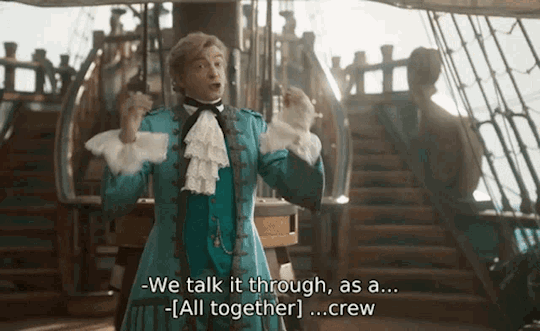
#the izcourse#izzy critical#izzy canyon#ofmd discourse#ofmd fandom discourse#fandom racism#fandom discourse#restorative justice#long post#tl;dr something’s gotta change so#if you won’t do it for love of community or a commitment to anti racism and anti oppression#do it because ppl engaging with my last post really fucking pissed off izzy/Stede anon#like they really went on a field day last week#I won’t repost the extreme shit they sent ppl#Izzy-anti-archive is doing the hard work of keeping that#anyway I turned off anon after the last message I got#yes I see you. no you’re not getting a platform from my little fandom blog#and yes the shit you say is very racist AND hurtful#you get no freely given access to me#I strongly suggest others turn off anon too#izzy critical fans are right about the fact that rn all that we can do about anon is to ice them out#🤷🏽♀️#didn’t add this to the body of the post because it’s long enough as it is
55 notes
·
View notes
Text
BDSM Education Online: A Call for Accuracy and Responsibility
In the vast and intricate realm of online BDSM education, the dissemination of inaccurate or misleading information poses a significant threat to those seeking knowledge within the community. The potential harm caused by misinformation necessitates a heightened awareness among individuals navigating the complexities of BDSM practices. Aspiring BDSM enthusiasts must be discerning and cautious, as inaccurate guidance not only perpetuates harmful stereotypes but also jeopardizes the safety and well-being of participants. Recognizing the need for a reliable compass in this diverse landscape, it becomes imperative to scrutinize and avoid individuals who purport to be educational creators but may compromise the authenticity and inclusivity of the information they provide.
Genuine BDSM creators and teachers comprehend and honor the
diversity within the community, acknowledging various gender identities, sexual orientations, and relationship dynamics. When one endorses harmful stereotypes or excludes specific groups from the conversation, it raises concerns about the accuracy and inclusivity of their content. Those who employ misogynistic language not only contribute to a toxic environment but also perpetuate harmful ideals. In contrast, authentic lifestyle practitioners prioritize inclusive language, recognizing that expressions within the BDSM community should be respectful, diverse, and considerate of the myriad identities and orientations present. The harm inflicted by those who promote stereotypes underscores the responsibility of the community to foster an environment that embraces diversity and rejects discriminatory narratives.
Those who decide to educate must delve into the intricate and diverse nature of kinks, such as spanking, to counteract misconceptions that oversimplify these practices as mere punishment. Within the BDSM community, consensual spanking encompasses a nuanced and varied spectrum of experiences, extending beyond disciplinary measures. From playful enjoyment that adds a layer of fun and entertainment to dynamics, to the deliberate reinforcement of power dynamics within relationships, these practices serve different purposes for individuals. Failing to acknowledge and educate about this diversity not only misrepresents the reality of BDSM but also perpetuates harmful stereotypes. It is equally essential for educational creators to broaden their understanding beyond personal preferences, desires, and kinks. This involves educating themselves on a spectrum of kinks, even those that may not align with their interests. By doing so, creators who seek to educate contribute to a more comprehensive and accurate portrayal of the diverse experiences within the BDSM community, fostering a space that values inclusivity and understanding.
In lifestyle education, the centrality of consent cannot be overstated. It is a fundamental pillar that underpins the ethical and responsible exploration of BDSM. Disconcertingly, some individuals purporting to be BDSM gurus disseminate content that neglects or downplays the significance of consent, thereby perpetuating a hazardous narrative that can contribute to an environment where violations are more likely to occur. The FRIES method of consent, emphasizing that consent must be Freely Given, Reversible, Informed, Enthusiastic, and Specific, serves as a crucial guideline to ensure clear and enthusiastic agreement in all lifestyle activities. This framework seeks to establish a robust foundation for consensual interactions within the BDSM community. The urgency of emphasizing consent is underscored by the sobering statistic from the National Coalition For Sexual Freedom, revealing that one in five individuals may experience consent violations within five years of exploring the lifestyle. This alarming prevalence emphasizes the imperative for accurate education and advocacy regarding the importance of consent in maintaining a safe and respectful environment within the BDSM community.
A notable red flag in lifestyle educational content is the presence of inconsistencies or contradictions in the information they provide. Authentic creators uphold a commitment to accuracy and consistency in their work, emphasizing the importance of reliable information within the community. In contrast, those lacking genuine knowledge may inadvertently reveal their shortcomings by sharing conflicting or inaccurate details. These inconsistencies serve as crucial warning signs for individuals seeking reliable guidance, urging a discerning approach to distinguish between credible creators and those who may compromise the integrity of BDSM knowledge.
The absence of active engagement within the broader BDSM community, beyond niche platforms, raises significant concerns about the authenticity of purported gurus. Legitimate creators consistently participate in community events, express their perspectives on platforms like FetLife, and establish a presence in other spaces where community members actively scrutinize and challenge information. The lack of such engagement serves as a potential indicator that an individual may lack a credible connection within the BDSM community, thereby casting doubt on the reliability of the information they provide. The collective vigilance and commitment of the community to uphold accurate and responsible BDSM practices emphasize the critical importance of active involvement for those professing to be experts in this diverse and dynamic landscape.
In the context of creators disseminating inaccurate information, it is crucial to recognize the pivotal role of safety protocols in fostering responsible BDSM practices. Genuine leaders possess a comprehensive understanding of fundamental concepts like SSC (Safe, Sane, Consensual), RACK (Risk-Aware Consensual Kink), PRICK (Personal Responsibility Informed Consensual Kink), and the 4C’s (Caring, Communication, Consent, and Caution). However, the importance extends beyond mere knowledge; creators must actively correct and refrain from sharing misrepresentations to ensure the dissemination of accurate information. An alarming example is the misinterpretation of PRICK, where it was erroneously defined as Pressure, Restriction, Intense Sensation, Cock Torture, rather than its accurate representation as Personal Responsibility Informed Consensual Kink. Such misrepresentations not only perpetuate harmful stereotypes but also erode the foundations of responsible and consensual kink practices. Moreover, authentic individuals exhibit respect for diverse protocols within the BDSM community, refraining from dismissive statements like "avoid anyone who does not follow SSC." This acknowledgment of diversity ensures a more inclusive and informed approach to BDSM education.
Those who legitimately embrace the lifestyle community acknowledge that disagreements and mistakes are inherent to the human experience and are crucial in navigating this complex landscape. Authentic creators recognize the fallibility of knowledge and appreciate the human element in learning. Those genuinely committed to fostering a better BDSM community welcome constructive criticism and the identification of mistakes, understanding that respectful discussions of alternate views contribute to a more nuanced understanding of the lifestyle. Emphasizing that there is no singular correct way to engage in BDSM, these souls encourage a diverse range of perspectives. Given the online nature of these discussions, the essence of a respectful dialogue is key, emphasizing the importance of sharing alternative views with kindness rather than launching personal attacks on creators or their work. This approach not only enriches the community's collective knowledge but also fosters an environment of mutual respect and continuous learning.
Individuals in the online BDSM community must be vigilant and discerning in their choice of educational creators. The harm inflicted by those who disseminate inaccurate or misleading information underscores the critical need for accurate education within the BDSM community. Genuine advisers, cognizant of the diverse nature of the community, prioritize inclusivity, respect, and responsible teachings. Learners must be aware of red flags, such as the endorsement of harmful stereotypes or the absence of engagement within the broader BDSM community, which may indicate a lack of credibility. Furthermore, the acceptance of disagreements and mistakes as part of the learning process is a hallmark of authentic creators who actively welcome respectful discussions of alternate views. As individuals navigate the complexities of BDSM education online, a commitment to fostering an environment that values accuracy, diversity, and mutual respect is paramount in ensuring a thriving and safe community for all participants.
©TLK2023
#d/s relationship#bd/sm community#dom/sub#d/s community#my writing#bd/sm blog#bd/sm daddy#bd/sm kink#bd/sm lifestyle#bd/sm relationship#d/s
10 notes
·
View notes
Text
Before going to look for the team, I have a handful of FTEs saved up that I want to pop. So I'm going to warp time and space to go hang out with everyone instead of hunting for them.
Let's see, I have two for Halara and one for Desuhiko.
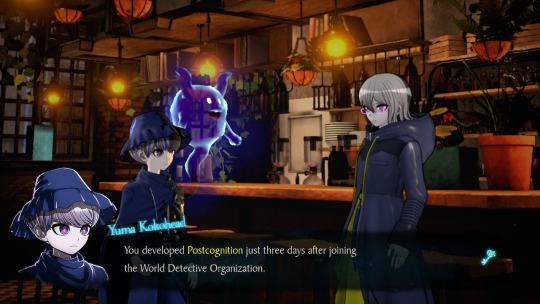
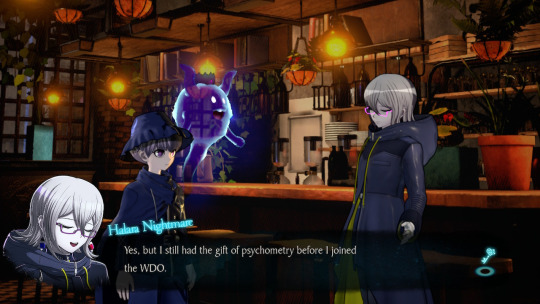
WDO is the Xavier School for Gifted Youngsters confirmed. People already have superpowers; the Master Detective program teaches them to hone them. Postcognition is an advanced form of psychometry.
Psychometry's a fun superpower. It's the psychic ability to view and experience the history of an object. Doesn't get talked about a lot in telekinesis/telepathy stuff, but it's an underrated gem of an ability.


Yuma needs to stop bringing this topic up. He keeps whining about not having a Forte but. Like.
Okay. So. His contract with Shinigami strictly forbids him from ever telling anyone about her or the contract. I guess people getting dragged in with him to Mystery Labyrinth doesn't count because those memories don't return with them to their body, so they never truly learn about any of this.
But he keeps raising this topic and. Like. The natural response of anyone who hears, "Why don't I have a Forte?" is going to be "You have Coalescence. Isn't that your Forte?"
And for all intents and purposes, he needs to shut up and let it be. Because there is no way to explain why that doesn't count as a real Forte. Every time he starts in on, "But I want a REEEEEEEAL Forte and not my Shinigami Contract Powers," he's verging dangerously close to violating the terms of his agreement. But he can't stop himself from talking about the things he must not speak of.
It's not unlike the way he constantly, endlessly expects fair play and good faith from crooked cops - like, he cannot comprehend corruption. It does not enter his brain as a thing that could ever exist. No one wouldn't fairly and earnestly seek truth, of course not, that kind of person doesn't exist!
Yuma is so honest that it manages to wrap around and become a character flaw.
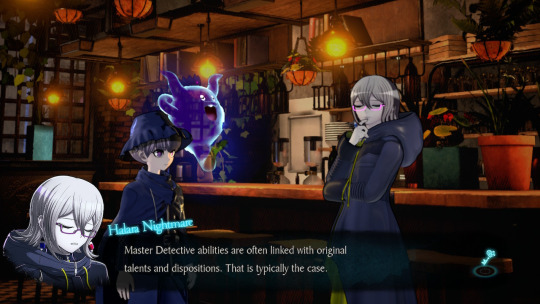
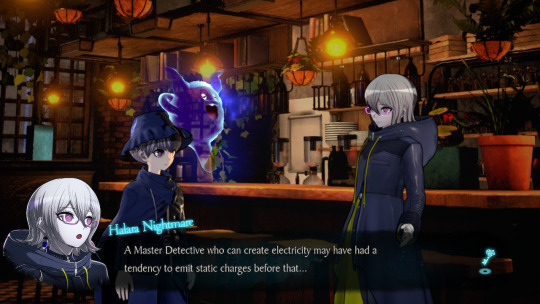
I have absolutely no idea what the ability to fry people with electrokinesis has to do with investigating crimes, but this is only further confirmation that the WDO is the Xavier School.

Being super honest to the point of being overly trusting and gullible is Yuma's main talent. So... it would follow that his Forte is... the ability to disseminate a large amount of information freely to everyone around him?
...that sounds weak but no, the power to widely broadcast knowledge would be a killer ability for trying to unravel a corporate conspiracy. It might even offer an alternative for mystery-cracking to the Mystery Labyrinth. Try and aim for that, Yuma.
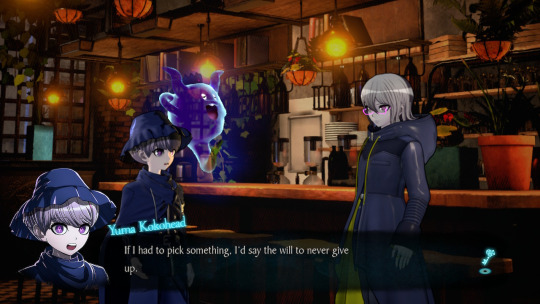
Oh, no. No no no no no. That's not true. Not at all.
Every time you capitulate to Shinigami and resort to the Mystery Labyrinth to solve a case, that's an act of giving up. It's a tacit admission of the futility of trying to crack the case yourself. You still put a lot of work into the Labyrinth, don't get me wrong; But someone who never gives up wouldn't grab Shinigami's hand out of desperation - Especially given how much you loathe to do it.
Whenever you're backed into a corner by Amaterasu security, you panic. Then you sell the lives of the culprits to Shinigami in exchange for a supernatural handicap. That's giving up, Yuma.


This feels like powerful foreshadowing, especially given the double meaning of "death" and the parasitic horror floating over Yuma's shoulder.
But even if that winds up being the writer's interpretation, I stand by what I said. If Yuma had an iron will to never give up, then every case wouldn't end in him going, "OH NO IT'S HOPELESS! Help me, Shinigami! I accept the lethal consequences that I despise as a cost of letting your evil powers help!"
Maybe the first time, sure. But after that, every time he resorts to the Mystery Labyrinth, it's an act of surrender.
12 notes
·
View notes
Text

@weaselmonkey See like, this is kind of what makes me insane, right? I never did much with the original tabletop ruleset and lore, my introduction to the series was the mechwarrior pc series, so I don't know much about how things were before the battletech novels started coming out, but so much of the setting post 3025 completely fails to capture that fascinating idea of a bunch of feudal star empires growing steadily more backwards as they wage bloody wars back and forth
and part of that is because VERY early on in the novels, they recover a memory core of the star league and disseminate it across the galaxy, so the loss of technology stops being a huge factor,
but it's ALSO that most of the writers were deeply orientalist (and honestly most -ists you can think of, really) and so a lot of the stories about the draconis combine and the capellan confederation cast them as the bad guys as a matter of course, so even the 4th succession war doesn't come across as hanse davion being a villain (plus it's barely covered in the books)
and I blame a lot of the problems in the novels on Michael Stackpole (which is maybe a little unfair because yes, he's responsible for much of what I hate, but pretty much every other writer was doing the exact same shit) because of the introduction of victor steiner-davion and phelan kell, two of the worst and most irritating characters in the battletech novels, because they suck all the nuance and grey out of the story. Phelan and victor are unambiguously the good guys in every story that they're in, even when they do bad things it's with the best of intentions (victor replacing joshua marik, for example, is a horrific awful thing but portrayed as genuinely compassionate by victor because he can't be a bad guy)
and putting aside the clans (which is it's own goddamn thing), much of the inner sphere conflicts that occur after the 4th succession war are pretty cut and dried too - the st ives compact is pretty clearly sympathetic and supposed to be the good guys, because sun-tzu is an evil nasty chinese man (and he's craaaazy), and the fedcom civil war, despite having some of the best writing in the series with novels like flashpoint, still pretty unambiguously makes katrina out to be a witch and all the lyrans unsympathetic, and victor is the good guy just trying to do the right thing.
I genuinely don't know if there's any fiction set before 3025, all the novels take place after that time frame, but a lot of the early succession wars or the Age of War sound fascinating to me, but I have to temper that hope with the knowledge that both the established fiction I HAVE read is bad, and also that a lot of the star league history is wild - I went a little crazy reading about how the star league was the height of human civilization and a galaxy spanning peaceful democracy but also it was an empire that brutally subjugated outlying nations and was ruled by hereditary monarchs
5 notes
·
View notes
Text
✦ Maeve Lysse ✦
Knowledge Cleric of Mystra

[ detailed character background under the cut ]
✦ General ✦
Age: 30s
Height: 5' 6"
Race: Half-Elf [High Elf / Human]
➥ Father - Ríkorin Lysse
Race: High Elf
Background: Noble
Class: Knowledge Cleric of Corellon Larethian
➥ Mother - Evelyn Lysse
Race: Human
Background: Guild Artisan
Class: College of Lore Bard
Background: Sage
Class: Knowledge Cleric of Mystra
Familiar: Ailmar the Rat
➥ Provided to her by an enchanted ring artefact that her father gifted to her on her birthday, to keep her company in her studies
✦ Backstory ✦
Maeve was born at the crossroads of two very different worlds, born amidst a blended backdrop of beauty and a love for learning.
Her father, an esteemed noble elven cleric, dedicated his life to the preservation and dissemination of knowledge, instilling a reverence for knowledge in Maeve. He possessed a passion for the past and was a respected historian, known for his vast collection of ancient tomes and scrolls from bygone eras that he kept in a grand library. He was a beacon of truth and light in the community in his determination to preserve knowledge.
Her mother was a charismatic human bard who traveled the land, collecting stories from every corner and weaving them into enchanting ballads of valor and love. Known for her tales that captivated even the coldest of hearts, she instilled a deep admiration in Maeve for the power of the emotions that drive stories as she enchanted their evenings with the tales and melodies that filled their home. Her parents' union was a testament to harmonious love, transcending boundaries between two worlds.
In their harmony, Maeve grew up amidst dusty books and soothing lullabies, creating a magical ambiance to her youth - the family studied together and learned, content in their own peace. Her childhood was one of quiet and curious introspection, but even in the peaceful climate of her childhood, she grew disconnected from others with her deep appreciation for history and stories, and this rift only deepened further as an accident altered the Lysse family's standing within their community.
One summer evening during her adolescence, her father brought home a mysterious magical artefact, hoping to decode its history with the family studying it together. Then, without warning, a surge erupted from the artifact in a display of uncontrolled wild magic, engulfing their home in magic flames and warping the reality around them, causing a neighbor to inadvertently get trapped within the rift temporarily.
Although predominantly harmless, the incident left the community shaken as neighbors witnessed the events unfolding - fearful reserve for the powers of untamed magic drove rumors to spread that the Lysse family was meddling with forbidden dark magic they could not control. Though her parents tried to quell the stories, the damage was done - the community, fearful of their supposed powers and potential danger, started to distance themselves from the Lysse family.
Her parents tried to shield her from the harsh realities as best they could, supporting their daughter with what they could offer as they attempted to put their community at ease and rebuild their family's reputation. Maeve felt the heavy weight of their community's judgement, sensing their fearful glances and hearing the hushed and whispered conversations in rumors and theories.
The distrust of her community pushed Maeve deeper into the world of books as she sought refuge among her father's ancient tomes in what survived of his vast library - in her doubt, the realm of knowledge became her sanctuary.
Then, amidst the countless pages, she discovered a tome dedicated to Mystra, the goddess of magic. The more Maeve read about Mystra, the more she felt a profound connection - Mystra's doctrine spoke of understanding magic's weave and harnessing its potential, responsibly. The importance of knowledge resonated deeply with Maeve's own experiences, and she found solace in the tome's teachings and a glimmer of hope for her family.
Her devotion to Mystra grew as she poured all of her energy to learn more, and Maeve became a Knowledge Cleric under her. She believed that by channeling the teachings of Mystra, she could control and harness magic while respecting its power and using it to protect as well as teach and spread a better understanding to others.
Maeve's quest for knowledge was not just limited to books; she learned from her mother the art of storytelling, understanding that stories held power, just as spells did - that tales could challenge perceptions, change minds, and, most importantly, heal. Through tales, she could reach people’s hearts and minds, making them see the world through a different lens. She combined the factual rigor of her father’s historical approach with the emotional impact of her mother's songs, creating a unique blend of storytelling that brought history to life in an attempt to foster understanding.
The deeper she delved into the mysteries of magic and history, the more Maeve's curiosity was piqued as she realized that there was a disconnect in the stories surrounding Mystra; there were gaps in the history, missing tales, and whispered rumors of lost artefacts. Maeve dedicated herself to unraveling these mysteries and bridging the gaps, hopeful that doing so might rebuild her family's reputation through education.
Maeve saw herself as a bridge – between history and story, between knowledge and faith. Despite the disconnect she felt growing up, she craved the acceptance of her community and believed that she was uniquely positioned to bring understanding and unity where there was division.
Through her devotion to Mystra and her pursuit of lost knowledge, Maeve hopes to find her own place in the world amongst the stories, determined to illuminate the shadows of ignorance and bring light and understanding to her community and heal the social wounds of her family within it.


7 notes
·
View notes